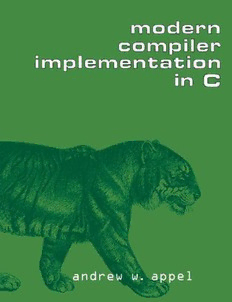Table Of ContentModern Compiler Implementation in C
Modern Compiler
Implementation
in C
ANDREW W. APPEL
PrincetonUniversity
with MAIA GINSBURG
PUBLISHED BY THE PRESS SYNDICATE OF THE UNIVERSITY OF CAMBRIDGE
The Pitt Building, Trumpington Street, Cambridge, United Kingdom
CAMBRIDGE UNIVERSITY PRESS
The Edinburgh Building, Cambridge CB2 2RU, UK
40 West 20th Street, New York NY 10011–4211, USA
477 Williamstown Road, Port Melbourne, VIC 3207, Australia
Ruiz de Alarcón 13, 28014 Madrid, Spain
Dock House, The Waterfront, Cape Town 8001, South Africa
http://www.cambridge.org
Informationonthistitle:www.cambridge.org/9780521583909
© Andrew W. Appel and Maia Ginsburg 1998
This book is in copyright. Subject to statutory exception
and to the provisions of relevant collective licensing agreements,
no reproduction of any part may take place without
the written permission of Cambridge University Press.
First published 1998
Revised and expanded edition of Modern Compiler Implementation in C: Basic Techniques
Reprinted with corrections, 1999
First paperback edition 2004
Typeset in Times, Courier, and Optima
A catalogue record for this book is available from the British Library
Library of Congress Cataloguing-in-Publication data
Appel, Andrew W., 1960–
Modern compiler implementation in C / Andrew W. Appel with Maia Ginsburg. – Rev.
and expanded ed.
x, 544 p. : ill. ; 24 cm.
Includes bibliographical references (p. 528–536) and index.
ISBN 0 521 58390 X (hardback)
1. C (Computer program language) 2. Compilers (Computer programs)
I. Ginsburg, Maia. II. Title.
QA76.73.C15A63 1998
005.4´53—dc21 97-031089
CIP
ISBN 0 521 58390 X hardback
ISBN 0 521 60765 5 paperback
Contents
Preface ix
PartI Fundamentals ofCompilation
1 Introduction 3
1.1 Modulesandinterfaces 4
1.2 Toolsandsoftware 5
1.3 Datastructures fortreelanguages 7
2 LexicalAnalysis 16
2.1 Lexicaltokens 17
2.2 Regularexpressions 18
2.3 Finiteautomata 21
2.4 Nondeterministic finiteautomata 24
2.5 Lex:alexicalanalyzer generator 30
3 Parsing 39
3.1 Context-free grammars 41
3.2 Predictiveparsing 46
3.3 LRparsing 56
3.4 Usingparsergenerators 69
3.5 Errorrecovery 76
4 AbstractSyntax 88
4.1 Semanticactions 88
4.2 Abstractparsetrees 92
5 SemanticAnalysis 103
5.1 Symboltables 103
5.2 BindingsfortheTigercompiler 112
v
CONTENTS
5.3 Type-checking expressions 115
5.4 Type-checking declarations 118
6 ActivationRecords 125
6.1 Stackframes 127
6.2 FramesintheTigercompiler 135
7 TranslationtoIntermediateCode 150
7.1 Intermediate representation trees 151
7.2 Translation intotrees 154
7.3 Declarations 170
8 BasicBlocksandTraces 176
8.1 Canonical trees 177
8.2 Tamingconditional branches 185
9 InstructionSelection 191
9.1 Algorithmsforinstruction selection 194
9.2 CISCmachines 202
9.3 Instruction selection fortheTigercompiler 205
10 LivenessAnalysis 218
10.1 Solutionofdataflowequations 220
10.2 LivenessintheTigercompiler 229
11 RegisterAllocation 235
11.1 Coloringbysimplification 236
11.2 Coalescing 239
11.3 Precolored nodes 243
11.4 Graphcoloring implementation 248
11.5 Registerallocation fortrees 257
12 PuttingItAllTogether 265
PartII Advanced Topics
13 GarbageCollection 273
13.1 Mark-and-sweep collection 273
13.2 Referencecounts 278
vi
CONTENTS
13.3 Copyingcollection 280
13.4 Generational collection 285
13.5 Incremental collection 287
13.6 Baker’salgorithm 290
13.7 Interface tothecompiler 291
14 Object-OrientedLanguages 299
14.1 Classes 299
14.2 Singleinheritance ofdatafields 302
14.3 Multipleinheritance 304
14.4 Testingclassmembership 306
14.5 Privatefieldsandmethods 310
14.6 Classlesslanguages 310
14.7 Optimizingobject-oriented programs 311
15 FunctionalProgrammingLanguages 315
15.1 Asimplefunctional language 316
15.2 Closures 318
15.3 Immutablevariables 319
15.4 Inlineexpansion 326
15.5 Closureconversion 332
15.6 Efficienttailrecursion 335
15.7 Lazyevaluation 337
16 PolymorphicTypes 350
16.1 Parametricpolymorphism 351
16.2 Typeinference 359
16.3 Representation ofpolymorphic variables 369
16.4 Resolution ofstaticoverloading 378
17 DataflowAnalysis 383
17.1 Intermediate representation forflowanalysis 384
17.2 Variousdataflowanalyses 387
17.3 Transformations usingdataflowanalysis 392
17.4 Speedingupdataflowanalysis 393
17.5 Aliasanalysis 402
18 LoopOptimizations 410
18.1 Dominators 413
vii
CONTENTS
18.2 Loop-invariant computations 418
18.3 Induction variables 419
18.4 Array-bounds checks 425
18.5 Loopunrolling 429
19 StaticSingle-AssignmentForm 433
19.1 Converting toSSAform 436
19.2 Efficientcomputation ofthedominator tree 444
19.3 Optimization algorithmsusingSSA 451
19.4 Arrays,pointers, andmemory 457
19.5 Thecontrol-dependence graph 459
19.6 Converting backfromSSAform 462
19.7 Afunctional intermediate form 464
20 PipeliningandScheduling 474
20.1 Loopscheduling withoutresource bounds 478
20.2 Resource-bounded looppipelining 482
20.3 Branchprediction 490
21 TheMemoryHierarchy 498
21.1 Cacheorganization 499
21.2 Cache-block alignment 502
21.3 Prefetching 504
21.4 Loopinterchange 510
21.5 Blocking 511
21.6 Garbagecollection andthememoryhierarchy 514
Appendix:TigerLanguageReference Manual 518
A.1 Lexicalissues 518
A.2 Declarations 518
A.3 Variablesandexpressions 521
A.4 Standardlibrary 525
A.5 SampleTigerprograms 526
Bibliography 528
Index 537
viii
Preface
Overthepastdecade, therehavebeenseveralshiftsinthewaycompilersare
built. New kinds of programming languages are being used: object-oriented
languages with dynamic methods, functional languages with nested scope
andfirst-classfunctionclosures;andmanyoftheselanguagesrequiregarbage
collection.Newmachineshavelargeregistersetsandahighpenaltyformem-
oryaccess,andcanoftenrunmuchfasterwithcompilerassistanceinschedul-
inginstructions andmanaginginstructions anddataforcachelocality.
This book is intended as a textbook for a one- or two-semester course
in compilers. Students will see the theory behind different components of a
compiler, the programming techniques used to put the theory into practice,
and the interfaces used to modularize the compiler. To make the interfaces
and programming examples clear and concrete, Ihave written them in the C
programming language. Othereditions ofthisbookareavailable thatusethe
JavaandMLlanguages.
Implementationproject. The“studentprojectcompiler”thatIhaveoutlined
is reasonably simple, but is organized to demonstrate some important tech-
niques that are now in common use: abstract syntax trees to avoid tangling
syntaxandsemantics,separationofinstructionselectionfromregisteralloca-
tion,copypropagationtogiveflexibilitytoearlierphasesofthecompiler,and
containment of target-machine dependencies. Unlike many“student compil-
ers” found in textbooks, this one has a simple but sophisticated back end,
allowinggoodregisterallocation tobedoneafterinstruction selection.
Each chapter in Part I has a programming exercise corresponding to one
moduleofacompiler.Softwareusefulfortheexercisescanbefoundat
http://www.cs.princeton.edu/˜appel/modern/c
ix

